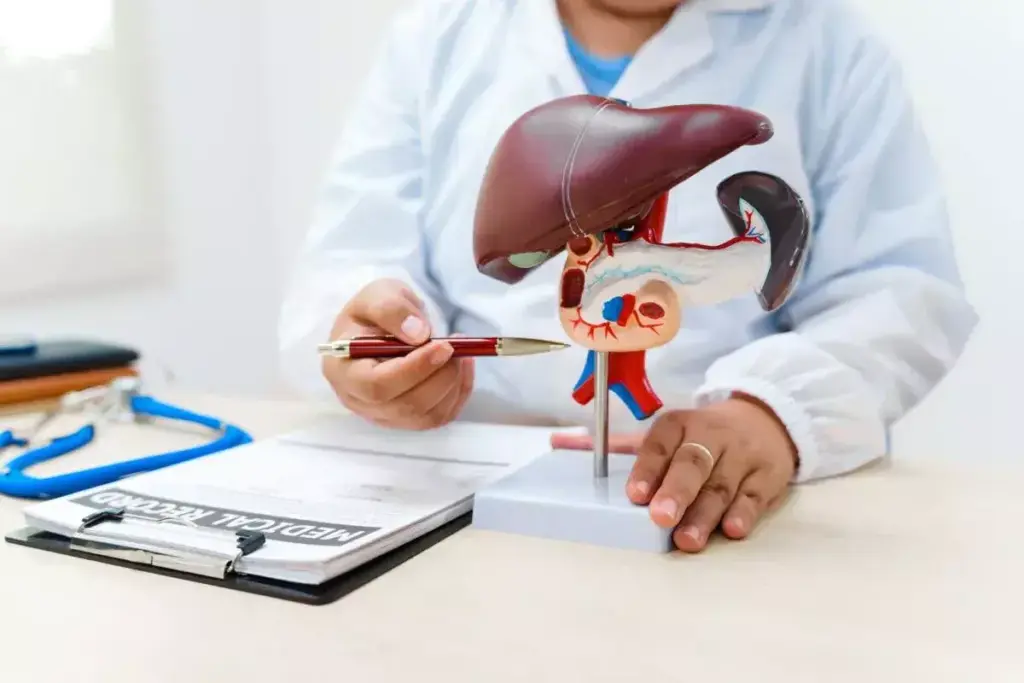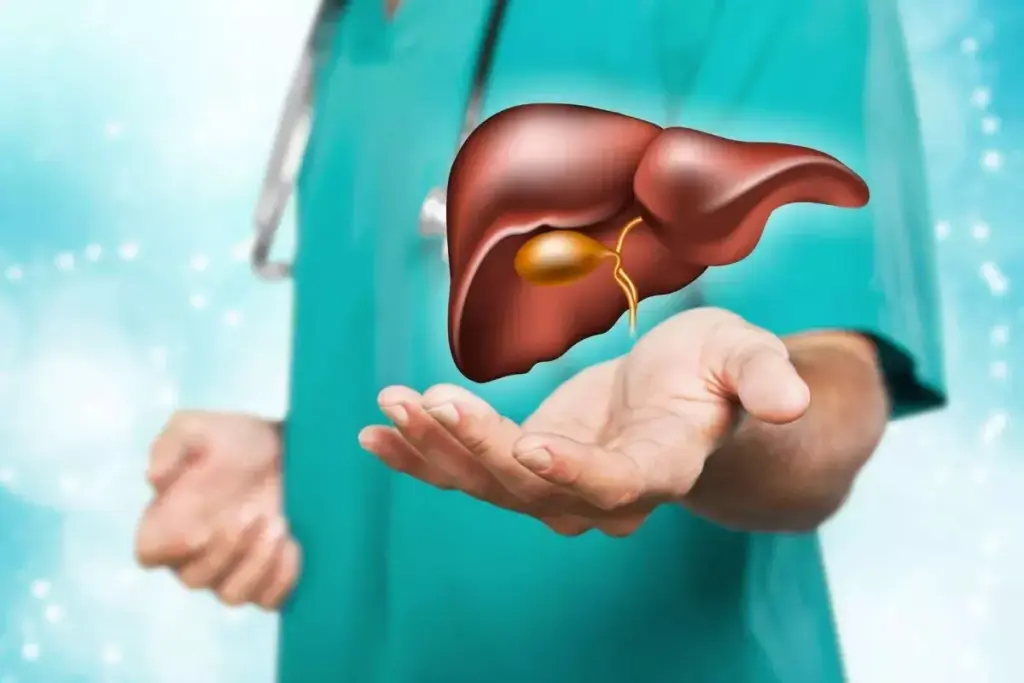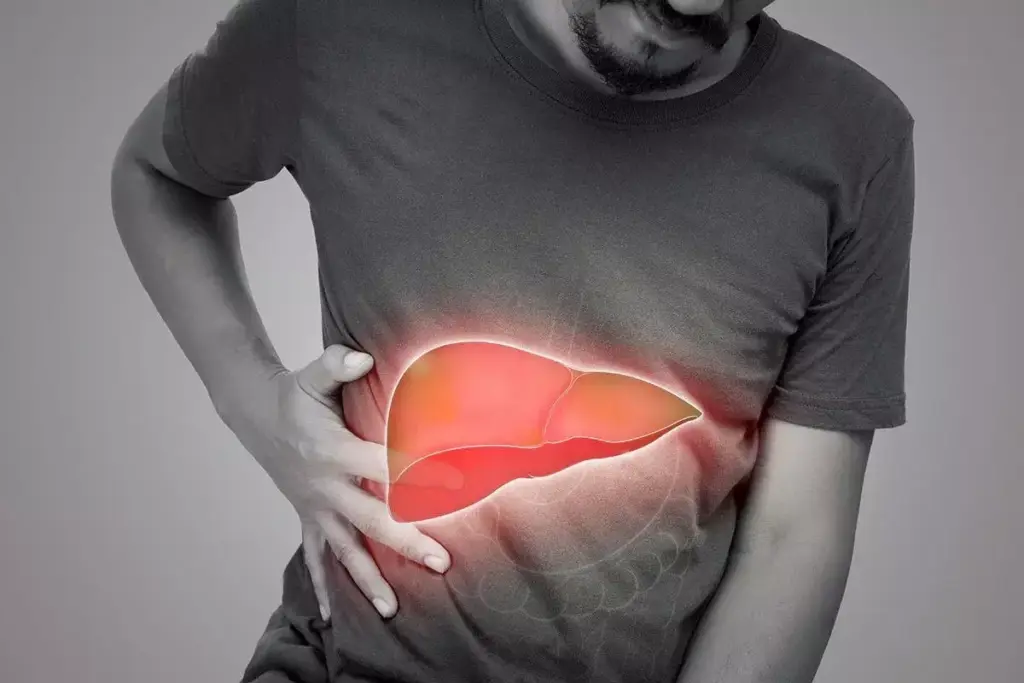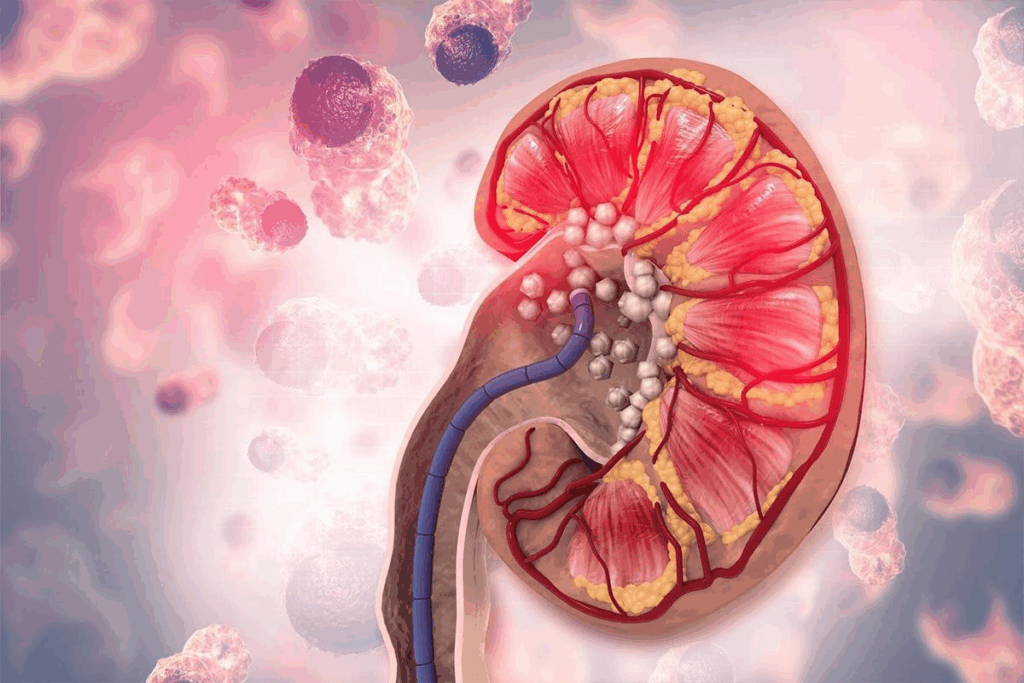
Living with kidney disease is tough, and symptoms like diarrhea make it even harder. At Liv Hospital, we understand how these issues affect our patients’ health.Can kidney issues cause diarrhea? Learn about the complex relationship between kidney disease and gastrointestinal symptoms.
Kidney disease can cause a buildup of harmful toxins. These toxins can upset the stomach and cause symptoms like diarrhea. It’s important to know this to manage and treat the disease effectively.
Diarrhea can make kidney disease worse, leading to serious complications. It can even cause kidney failure. It’s key for patients to get the right care to manage these issues.
Key Takeaways
- Diarrhea is a common symptom in patients with kidney disease.
- Uremic toxins can irritate the gastrointestinal tract, leading to diarrhea.
- Effective management of kidney disease requires understanding its connection to gastrointestinal symptoms.
- Diarrhea can worsen kidney disease and lead to complications.
- Comprehensive care for kidney disease patients includes addressing gastrointestinal symptoms.
The Relationship Between Kidney Function and Digestive Health
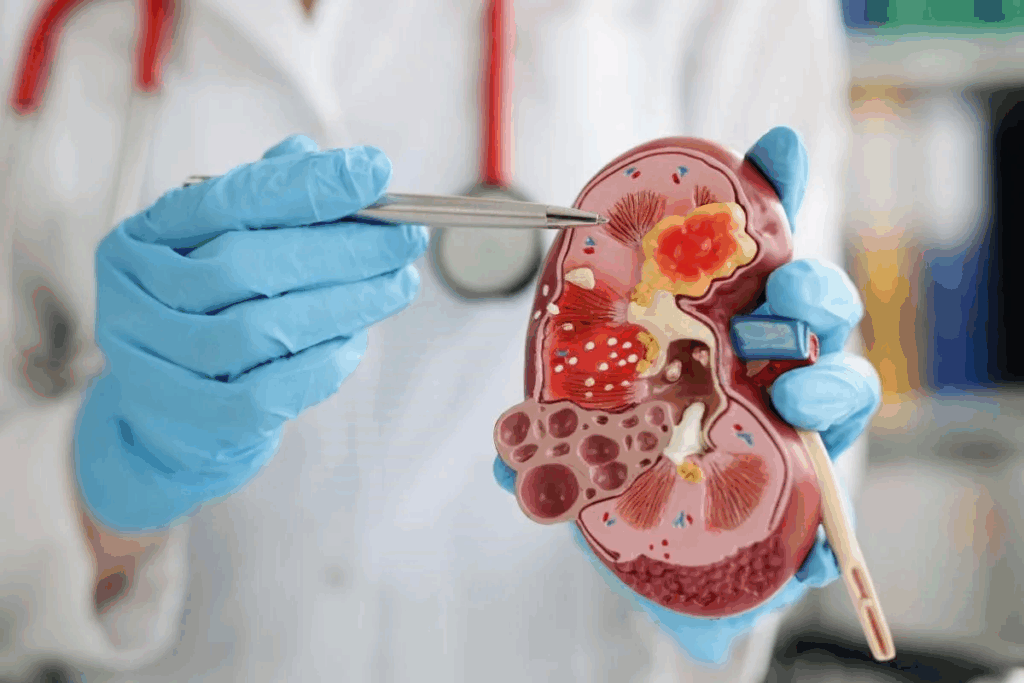
Kidney function and digestive health are closely linked. Kidney problems can cause many stomach issues. The kidneys help keep us healthy by removing waste and managing fluids.
When the kidneys don’t work right, it affects the whole body. This includes the digestive system.
How Kidneys Affect Overall Body Systems
The kidneys play a big role in our health:
- They filter waste and toxins from the blood.
- They help keep electrolyte balances right.
- They manage how much fluid we have.
- They make hormones that help our bones and blood.
When the kidneys don’t work well, these important jobs get messed up. This can affect the digestive system a lot.
The Gut-Kidney Axis: An Emerging Concept
The gut-kidney axis is a new idea. It talks about how the kidneys and the gut talk to each other. This idea is important for understanding kidney disease.
The Gut-Kidney Axis
- There’s a two-way street between gut health and kidney function.
- Toxins from the gut can harm the kidneys.
- Kidney problems can cause stomach issues.
Studies show that people with kidney failure often have stomach problems. Up to 79% of them do. This shows how closely the kidneys and digestion are connected.
Condition | Prevalence of GI Symptoms |
End-Stage Renal Disease (ESRD) | 77%-79% |
Chronic Kidney Disease (CKD) | Varies by stage and individual |
Acute Kidney Injury (AKI) | Often associated with GI symptoms during acute phases |
Understanding Kidney Disease: Types and Progression
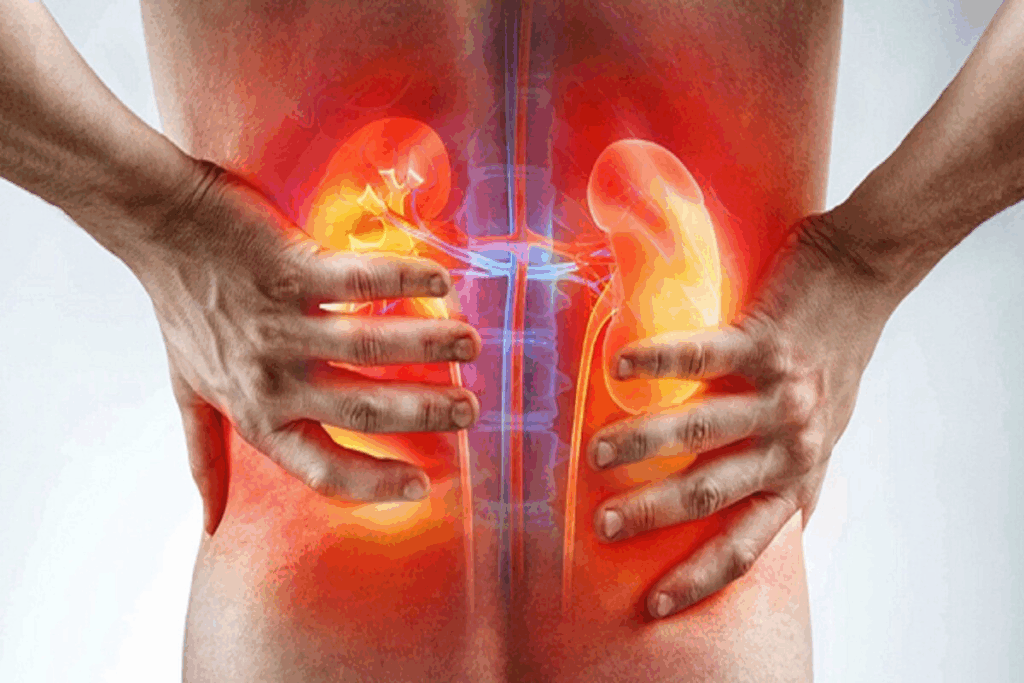
Kidney disease comes in many forms and can lead to serious health issues. Symptoms like diarrhea are common. We’ll look at the different types of kidney disease and how they progress to understand their impact on health.
Acute Kidney Injury vs. Chronic Kidney Disease
Acute kidney injury (AKI) and chronic kidney disease (CKD) are two main types of kidney disease. AKI is a sudden loss of kidney function that can often be reversed with quick treatment. On the other hand, CKD is a gradual loss of kidney function over time, which can cause permanent damage if not managed well.
The main difference between AKI and CKD is when they start and if they can be reversed. Knowing these differences is key to creating the right treatment plans.
Stages of Chronic Kidney Disease
CKD goes through several stages, each showing a different level of kidney function. This is measured by the glomerular filtration rate (GFR). The stages are as follows:
Stage | GFR (mL/min/1.73m2) | Description |
1 | >90 | Kidney damage with normal or increased GFR |
2 | 60-89 | Mildly decreased GFR with kidney damage |
3a | 45-59 | Mildly to moderately decreased GFR |
3b | 30-44 | Moderately to severely decreased GFR |
4 | 15-29 | Severely decreased GFR |
5 | Kidney failure or end-stage renal disease |
Knowing these stages helps in managing the disease and its complications. This includes symptoms of kidney failure like diarrhea.
Common Causes of Kidney Dysfunction
Kidney dysfunction can be caused by many things, like diabetes, hypertension, and hemolytic uremic syndrome. Hemolytic uremic syndrome can damage the small blood vessels in the kidneys, leading to kidney failure.
It’s important to know these causes to prevent and manage kidney disease. By understanding the underlying factors, healthcare providers can create specific treatment plans. This helps slow disease progression and reduce symptoms like signs of kidney failure diarrhea.
Common Gastrointestinal Symptoms in Kidney Disease
It’s key to know about the GI symptoms linked to kidney disease. Patients often face many GI problems. These can make treatment harder and daily life more challenging.
GI symptoms are common in kidney disease, mainly in those with end-stage renal disease (ESRD). These symptoms can hit the upper GI, small bowel, and lower GI. This leads to various complications.
Prevalence of Digestive Issues in Kidney Patients
Research shows GI symptoms are common in kidney disease patients. Those with ESRD often face nausea and vomiting in the upper GI. They also deal with diarrhea and constipation in the lower GI.
Several factors contribute to these symptoms. These include:
- Uremic Toxins: Toxins in the blood from poor kidney function harm the GI tract.
- Medication Side Effects: Kidney disease patients take many meds. Some cause GI problems.
- Dietary Restrictions: Limited diets for kidney patients can cause GI discomfort.
Spectrum of GI Symptoms Beyond Diarrhea
Diarrhea is a big worry, but kidney disease patients face many GI symptoms. These include:
- Nausea and vomiting
- Abdominal pain
- Constipation
- Bloating and gas
These symptoms greatly affect a patient’s quality of life. It’s vital to tackle them in their care plan.
Understanding and managing GI symptoms helps improve kidney disease patients’ well-being. Healthcare providers play a big role in this.
Can Kidney Issues Cause Diarrhea? The Scientific Evidence
Kidney disease and diarrhea might be more connected than we thought. New research shows a link between kidney function and stomach problems. This shows that our kidneys and stomachs are more connected than we thought.
Research Findings on Kidney-Related Diarrhea
Studies show kidney disease patients often get stomach problems like diarrhea. About 19 percent of patients starting hemodialysis get diarrhea. This shows how common diarrhea is in severe kidney disease.
There are many reasons for diarrhea in kidney disease. These include a weak immune system, side effects from medicines, and changes in the gut because of toxins.
Statistical Prevalence in Different Kidney Conditions
Diarrhea’s frequency changes with different kidney diseases. For example, chronic kidney disease (CKD) patients often get stomach problems as their kidneys worsen.
Here’s what we know:
- CKD stage 4 or 5 patients get diarrhea more often than earlier stages.
- Diarrhea is common in dialysis patients, affecting their life quality and nutrition.
- Diarrhea in kidney transplant patients might be due to their medicines and other factors.
Knowing these facts helps doctors better manage symptoms and improve patient care.
Physiological Mechanisms: How Kidney Disease Leads to Diarrhea
It’s important to understand how kidney disease causes diarrhea. Kidney disease affects the body in many ways, including the digestive system. This happens through complex pathways.
Uremic Toxins and Intestinal Inflammation
Kidney disease leads to diarrhea mainly because of uremic toxins. When kidneys fail, they can’t filter waste from the blood. This leads to a buildup of toxins in the body.
These toxins cause inflammation in the intestines. This inflammation disrupts digestion and can cause diarrhea. Research shows that uremic toxins are a big reason for diarrhea in kidney disease patients.
Altered Gut Microbiome in Kidney Disease
Kidney disease also changes the gut microbiome. This is a two-way relationship between the gut and kidneys. Uremic toxins can change the gut’s bacteria, leading to imbalance.
This imbalance can make the gut work poorly. Studies show that kidney disease patients have different gut bacteria than healthy people. This can lead to diarrhea.
Abnormal Intestinal Motility Patterns
Uremic toxins can also affect the gut’s nerves and muscles. This can change how the gut moves food. This can cause diarrhea by moving food too fast.
Mechanism | Effect on Gut | Potential Outcome |
Uremic Toxins | Intestinal Inflammation | Diarrhea |
Altered Gut Microbiome | Dysbiosis | Gastrointestinal Symptoms |
Abnormal Motility | Rapid Transit | Diarrhea |
Small Intestinal Bacterial Overgrowth (SIBO)
Small Intestinal Bacterial Overgrowth (SIBO) is another cause of diarrhea in kidney disease patients. SIBO happens when there’s too much bacteria in the small intestine. This can cause poor nutrient absorption and diarrhea.
Patients with kidney disease are more likely to get SIBO. This is because of changes in gut motility and certain medications. Treating SIBO is key to managing diarrhea in these patients.
In conclusion, kidney disease causes diarrhea through many ways. These include uremic toxins, changes in gut bacteria, abnormal gut motility, and SIBO. Understanding these causes is key to treating diarrhea in kidney disease patients.
Diarrhea in Dialysis Patients: Special Considerations
Dealing with diarrhea is tough for people on dialysis. Their treatment can make stomach problems worse. Dialysis patients need special care because diarrhea can really hurt their quality of life.
Hemodialysis-Associated Diarrhea
Hemodialysis is a treatment for kidney failure. But, it can cause stomach problems like diarrhea. The fast changes in fluids and salts can upset the stomach.
Key factors contributing to hemodialysis-associated diarrhea include:
- Rapid fluid shifts
- Electrolyte imbalances
- Uremic toxins
Peritoneal Dialysis and Bowel Function
Peritoneal dialysis uses the stomach lining to clean the blood. It can mess with bowel movements in several ways.
- Increased intra-abdominal pressure
- Glucose absorption from the dialysate
- Potential for bacterial contamination
Dialysis Type | Common GI Complications | Management Strategies |
Hemodialysis | Diarrhea, constipation | Fluid management, dietary adjustments |
Peritoneal Dialysis | Bloating, constipation, diarrhea | Dietary modifications, laxatives, adjusting dialysate composition |
Managing Diarrhea During Dialysis Treatment
Handling diarrhea in dialysis patients needs a team effort. Doctors must look at the patient’s health, dialysis type, and any medicines that might cause diarrhea.
Strategies for managing diarrhea during dialysis treatment include:
- Adjusting dialysis parameters
- Dietary modifications
- Medications to control diarrhea
- Probiotics to maintain gut health
Patients should team up with their doctors to make a plan for diarrhea. Keeping a diary of symptoms can help find what triggers diarrhea.
The Bidirectional Relationship: How Diarrhea Affects Kidney Function
Diarrhea can harm our kidneys, mainly by causing dehydration and upsetting electrolyte levels. When we have diarrhea, we lose water and important electrolytes. These are key for our body’s functions, including how our kidneys work.
Dehydration and Acute Kidney Injury Risk
Severe diarrhea can cause dehydration, where we lose more fluids than we take in. This can lower blood volume and reduce blood flow to the kidneys. With less oxygen and nutrients, the kidneys might fail, leading to acute kidney injury (AKI).
Studies show dehydration from diarrhea is a big risk for AKI. This is true for the elderly and those with kidney problems.
Electrolyte Imbalances and Their Impact
Diarrhea also takes away essential electrolytes like potassium, sodium, and chloride. These are vital for nerve and muscle function and keeping the body’s acid-base balance. Without them, we might feel weak, have heart problems, and stress our kidneys more.
Long-term Consequences of Chronic Diarrhea on Kidneys
Chronic diarrhea can harm our kidneys over time. It can cause dehydration and electrolyte imbalances, leading to chronic kidney disease (CKD). CKD slowly damages kidney function, which can lead to needing dialysis or a transplant.
Here’s a table showing how chronic diarrhea can affect our kidneys:
Condition | Short-term Effects | Long-term Consequences |
Dehydration | Reduced blood flow to kidneys, possible AKI | Increased risk of CKD |
Electrolyte Imbalance | Muscle weakness, heart arrhythmias | Potential for CKD progression |
Chronic Diarrhea | Malnutrition, dehydration | CKD, possible AKI episodes |
It’s important to manage diarrhea well to avoid these problems and keep our kidneys healthy. We should drink plenty of water, balance our electrolytes, and find the cause of our diarrhea.
Diagnosing the Cause: Is It Kidney Disease or Something Else?
Diagnosing diarrhea in patients with kidney disease is a detailed process. It’s important to figure out if the diarrhea is linked to the kidney disease or another issue.
Differential Diagnosis of Diarrhea in Kidney Patients
When kidney disease patients have diarrhea, finding the cause is key. Doctors look at many possible reasons, including:
- Kidney disease-related factors: Uremic toxins, electrolyte imbalances, and side effects from medications.
- Gastrointestinal conditions: Inflammatory bowel disease, infections, and malabsorption syndromes.
- Dietary factors: Food intolerances, changes in diet, or malnutrition.
When to Seek Medical Attention
Kidney disease patients with diarrhea should know when to get medical help. Immediate attention is required if they have:
- Bloody stools or black, tarry stools
- Severe abdominal pain
- Fever above 101.5°F (38.6°C)
- Signs of dehydration, such as excessive thirst, dark urine, or decreased urination
- Diarrhea that persists or worsens over time
Studies show kidney disease patients face higher risks from gastrointestinal symptoms. Getting medical help quickly can prevent complications and manage their condition better.
Diagnostic Tests and Procedures
To find the cause of diarrhea in kidney disease patients, doctors use different tests and procedures, including:
- Stool tests to check for infections or blood
- Blood tests to assess electrolyte levels and kidney function
- Endoscopy or colonoscopy to examine the gastrointestinal tract
- Imaging studies, such as CT scans or X-rays, to evaluate the abdomen
These tests help doctors understand the cause of diarrhea. They can then create a treatment plan to help patients feel better and improve their health.
Treatment Approaches for Kidney Disease-Related Diarrhea
Managing diarrhea linked to kidney disease is complex. It involves understanding how kidneys and the gut work together. We’ll look at different ways to treat symptoms and improve health outcomes.
Medication Options and Considerations
Choosing the right medication for diarrhea in kidney disease patients is key. Some over-the-counter drugs might not be safe for those with kidney issues. Always talk to a doctor before starting any treatment.
Some treatments for diarrhea include:
- Anti-diarrheal medications to slow down bowel movements
- Probiotics to balance gut bacteria
- Medicines that target specific causes, like toxins
Medication Type | Use in Kidney Disease | Considerations |
Anti-diarrheal | Helps manage symptoms | May interact with other drugs |
Probiotics | Restores gut balance | Strain and dosage are important |
Uremic toxin binders | Targets the root cause | May need dose adjustments |
Dietary Modifications for Symptom Management
Changing what you eat is vital in managing diarrhea linked to kidney disease. Patients often follow a special diet tailored to their needs.
Some dietary tips include:
- Avoid foods high in potassium, phosphorus, and sodium
- Eat more fiber-rich foods to help with bowel movements
- Drink fluids that are safe for kidney disease patients
Addressing Underlying Kidney Issues
Dealing with diarrhea in kidney disease patients also means tackling the kidney problem itself. This might involve treatments to slow disease progression or manage complications.
Treatments may include:
- Medicines to control blood pressure and reduce protein loss
- Special diets to manage electrolyte levels
- Dialysis or transplant in severe cases
Emerging Therapeutic Approaches
New ways to manage diarrhea in kidney disease patients are being researched. This includes new medicines, probiotics, and other methods to improve gut health and reduce symptoms.
Some new research areas include:
- Using prebiotics to support gut health
- Targeted therapies to reduce toxins
- Advanced dialysis techniques for better toxin removal
Living with Kidney Disease: Managing Digestive Symptoms
For those with kidney disease, keeping the digestive system healthy is key. Kidney disease can affect many parts of the body, including the digestive system. This can lead to symptoms like diarrhea.
Practical Tips for Daily Management
Handling digestive symptoms needs a few steps. Here are some tips to help manage them:
- Drink lots of water to avoid dehydration, which can make digestive issues worse.
- Eat a balanced diet that’s gentle on your stomach, like a low-fiber or bland diet.
- Stay away from foods that can upset your stomach, such as spicy or fatty foods.
- Think about taking probiotics or supplements to help your gut, but talk to a doctor first.
Talking to a healthcare provider about medication side effects is also important. Some kidney disease meds can mess with your digestion.
Quality of Life Considerations
Living with kidney disease and dealing with digestive issues can really affect your life. It’s important to think about the emotional and mental sides of the disease.
Keeping a positive attitude and getting support from doctors, family, and friends can really help.
Quality of Life Aspect | Impact of Kidney Disease | Management Strategies |
Emotional Well-being | Anxiety, depression | Counseling, support groups |
Physical Comfort | Digestive symptoms, fatigue | Dietary adjustments, medication management |
Social Interactions | Embarrassment, isolation | Support networks, education |
Support Resources for Patients
There are many resources for people with kidney disease to help manage their condition.
- Support groups, online or in-person, offer a sense of community and understanding.
- Reputable organizations provide educational materials to help patients understand and manage their disease.
- Healthcare providers can give personalized advice and treatment plans.
By using these resources and following practical tips, people with kidney disease can improve their quality of life. They can also better manage their digestive symptoms.
Preventive Strategies: Reducing Risk of Complications
For those with kidney disease, taking steps to prevent complications is key. Focusing on staying hydrated, managing your diet, and monitoring your health closely can help. These actions can improve your life quality and manage your condition better.
Hydration Guidelines for Kidney Patients
Staying hydrated is vital for kidney disease patients. Drinking enough water helps your kidneys work right and prevents dehydration, which can harm your kidneys more. But, drinking too much water can also be bad. It’s best to talk to your doctor to find out how much water is right for you, based on your kidney disease stage.
Dietary Approaches to Prevent Diarrhea
Your diet is important for managing stomach issues in kidney disease. Eating a balanced diet that’s easy on your stomach can stop diarrhea. Choose foods like cooked veggies and fruits that are high in fiber but gentle. Avoid foods that can make diarrhea worse, like spicy or fatty foods.
Monitoring and Early Intervention
Keeping an eye on your kidney function and stomach symptoms is critical. Acting early can greatly improve your health by catching problems before they get worse. Work with your healthcare team to set up a plan for regular check-ups and tests.
Working with Your Healthcare Team
Managing kidney disease well and preventing complications need teamwork between you and your healthcare team. Talking openly about your symptoms, worries, and treatment plans is key. We urge you to ask questions, share any changes, and follow your treatment plan closely for the best results.
Conclusion: Understanding and Addressing the Kidney-Diarrhea Connection
It’s key to understand how kidney disease and diarrhea are linked. This knowledge helps in better managing the condition and improving patient care. We’ve looked into how kidney issues can cause stomach problems like diarrhea.
To handle diarrhea in kidney disease, we need a full plan. This plan should tackle both the kidney problems and the stomach symptoms. We’ve talked about how toxins, changes in gut bacteria, and abnormal bowel movements play a role.
Healthcare teams can now create better treatment plans thanks to this knowledge. They can use medicines, change diets, and try new treatments to fix the diarrhea’s root causes.
It’s vital for patients and doctors to work together. This teamwork helps manage kidney disease and its stomach side effects better. By doing so, we can make life better for those with kidney disease and lower the risk of diarrhea problems.
FAQ
Can kidney disease cause diarrhea?
Yes, kidney disease can cause diarrhea. Uremic toxins in the body can lead to stomach problems, including diarrhea.
What is the relationship between kidney function and digestive health?
The kidneys and digestive system are closely connected. Kidney problems can affect the gut, and vice versa.
How does kidney disease lead to diarrhea?
Kidney disease can cause diarrhea in several ways. This includes the buildup of toxins, changes in gut bacteria, and issues with intestinal movement.
Is diarrhea a common symptom of kidney disease?
Yes, many people with kidney disease experience diarrhea. This is more common in those with advanced kidney disease.
Can dialysis cause diarrhea?
Yes, dialysis can cause diarrhea. Both hemodialysis and peritoneal dialysis can lead to stomach problems due to fluid and electrolyte changes.
How can diarrhea affect kidney function?
Diarrhea can cause dehydration and imbalances in electrolytes. These issues can harm kidney function and increase the risk of kidney injury.
What are the treatment approaches for kidney disease-related diarrhea?
Treatments include medications, dietary changes, addressing kidney issues, and new therapies.
How can I manage diarrhea while living with kidney disease?
To manage diarrhea, stay hydrated and eat a kidney-friendly diet. Avoid foods that can trigger diarrhea. Work with your healthcare team to manage symptoms.
Can kidney disease cause abdominal pain?
Yes, kidney disease can cause abdominal pain. This pain can be due to toxins, stomach symptoms, or other complications.
What are the preventive strategies for reducing the risk of complications from diarrhea in kidney disease?
Preventive strategies include staying hydrated, eating a balanced diet, and monitoring symptoms. Work with your healthcare team to manage kidney issues and symptoms.
Does kidney failure cause diarrhea?
Yes, kidney failure can cause diarrhea. This is due to the buildup of toxins and metabolic changes.
Can kidney problems cause stomach issues?
Yes, kidney problems can cause stomach issues like nausea, vomiting, diarrhea, and pain. This is due to toxins and metabolic changes.
Are there any support resources available for patients living with kidney disease and managing digestive symptoms?
Yes, there are many support resources. These include patient organizations, online forums, and healthcare teams focused on kidney disease.
References
- NIH MedlinePlus. (2024, May 22). Crystals in urine. https://medlineplus.gov/lab-tests/crystals-in-urine/



